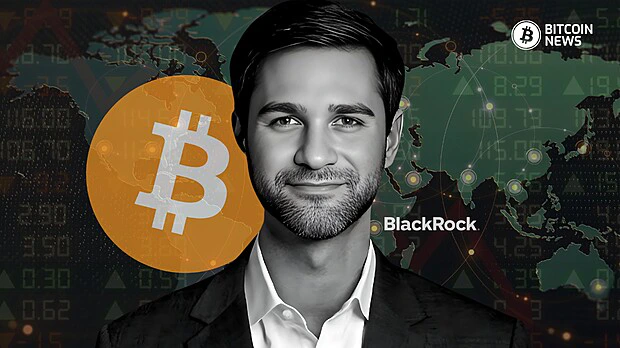In recent years, Bitcoin has increasingly moved from the fringes of finance into the spotlight. Once seen as a speculative asset with extreme volatility, it has now caught the eye of some of the world’s biggest financial institutions.
One of the most notable players to embrace Bitcoin is BlackRock, the world’s largest asset management firm, with over $9 trillion under its management. BlackRock has made bold claims about Bitcoin’s future, going so far as to call it a “hedge against global financial disorder.”
BlackRock Bitcoin sentiments seem to be shifting quite significantly, as the asset management giant had previously been more skeptical about the digital asset.
In a recent statement, the company described Bitcoin as a “global monetary alternative” and emphasized its role in safeguarding against geopolitical instability and declining trust in traditional financial institutions, like banks and fiat currencies.
Related: Bitcoin Adoption Will Surge as Trust in Fiat Falters Worldwide
Larry Fink, CEO of BlackRock, had previously praised Bitcoin, stating: “It’s no different than what gold represented over thousands of years. It is an asset class that protects you.”
He, along with other executives at the firm, has pointed to growing global uncertainty as one reason bitcoin has become increasingly attractive to investors.
Jay Jacobs, BlackRock’s Head of Thematic and Active ETFs, echoed this sentiment, highlighting Bitcoin’s volatility but also its potential as a financial hedge.
Interestingly, Jacobs compared bitcoin to gold, noting:
“Bitcoin is a nascent asset. It’s only one-tenth of the size of the gold market. Therefore, it has high volatility and behaves a bit differently than stocks and bonds.”
He highlighted that bitcoin’s future potential is massive, emphasizing that many investors see bitcoin not only as a hedge against geopolitical risks but also as a bet on the future of blockchain technology.
The core of BlackRock’s message is clear: Bitcoin is a hedge against increasing global disorder and declining trust in governments, banks, and fiat currencies.
This perspective has resonated with a wide range of investors, especially as geopolitical tensions rise and trust in traditional financial systems weakens.
As inflation and economic instability rise in various countries, Bitcoin offers a decentralized alternative that isn’t controlled by any single government or central bank. This makes it appealing to those who are concerned about potential disruptions to the global financial system.
This view of Bitcoin as a safe haven isn’t just BlackRock’s. Michaël van de Poppe, a well-known digital assets analyst, shares a similarly optimistic outlook.
He believes that bitcoin’s price could soar to between $300,000 and $600,000 in the coming years. “The current valuation of Bitcoin is still super low,” van de Poppe noted. He sees it as a long-term store of value, much like gold, but with far greater potential for growth.
In January 2024, BlackRock launched its highly anticipated Bitcoin Exchange-Traded Fund (ETF).
This move has been a significant milestone for both the company and the broader bitcoin market. Following the ETF’s launch, bitcoin’s price surged to a record high of $73,000 in March 2024, an increase that demonstrated the growing demand for bitcoin among institutional investors.
BlackRock’s Bitcoin ETF has quickly become one of the top-performing funds in the market, further solidifying bitcoin’s role as a mainstream investment asset.
Related: BlackRock’s IBIT Claims Third Spot Among Commodity Giants
The success of this ETF, along with other bitcoin-based funds, has sparked a wave of conversations in the finance industry about the future of digital assets.
According to BlackRock, the growing interest in bitcoin ETFs reflects a broader trend. Jacobs explains:
“A lot of investors look at Bitcoin as a potential hedge against geopolitical and monetary risks, other investors look at it as a way to play future adoption of blockchain technology. In either case, investors must take a measured approach to Bitcoin, considering both the risks and the potential returns of the asset.”
He also pointed out that bitcoin behaves differently than traditional assets like stocks and bonds, which makes it an attractive option for diversification.
As BlackRock and other major financial institutions continue to adopt Bitcoin, its role in the global financial system is expanding. Bitcoin is increasingly being viewed not just as a speculative asset, but as a legitimate alternative to fiat currencies, particularly in times of economic uncertainty.
Despite its volatility, bitcoin has shown resilience in recent years, with its value skyrocketing amid market upheavals. This has led some investors to consider it as a hedge against potential risks to the global financial system.
Central banks around the world are also paying attention. As concerns about the stability of the U.S. dollar and other fiat currencies grow, some central banks are exploring digital currencies as a way to protect themselves from future crises.
Bitcoin’s future remains uncertain, but its role as a hedge against global disorder appears to be growing. As traditional financial systems face mounting challenges, bitcoin offers an alternative that is decentralized, secure, and independent of government control.
BlackRock’s endorsement of Bitcoin has been a significant turning point, bringing the digital asset into the mainstream of global finance.
With institutional backing from companies like BlackRock and growing interest from investors, Bitcoin is no longer just a speculative asset. It’s becoming a key player in the future of finance.










